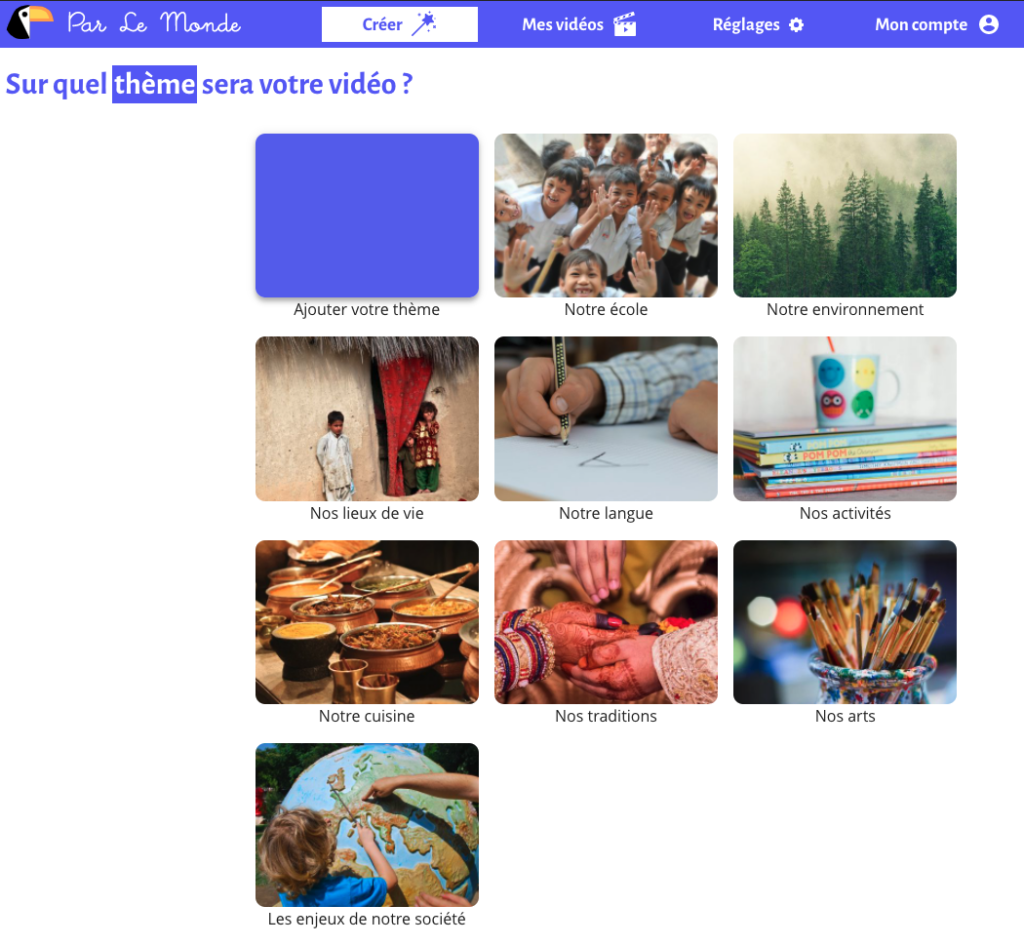Within the framework of a European project entitled ODIMET, the association Par Le Monde, the University of Education of Lower Austria (Pädagogische Hochschule Niederösterreich or PH NÖ) and the company Wemanity, provided the European teaching community with a concrete set of methodological tools for the production of cultural videos for children from 7 to 12 years old. This kit consists of the “Clap!” , as well as digital activities available for offline use, so that teachers can engage their classes in a fruitful life experience with their European peers. Per Le Monde, PH NÖ and Wemanity have designed educational guides and sheets to help achieve the educational goals of all users.
Indeed, convinced that digital correspondence can cultivate empathy and curiosity as well as guarantee the cohesion of future generations, this kit is an opportunity to maintain these values and disseminate them within the European community.
Several classes in France, Belgium and Austria took part in the game and set up these activities in order to test the proposed resources. The pupils exchanged via eTwinning , a secure platform for connecting education stakeholders in European countries. They shared their videos and asked each other questions about the culture of their mutual country.
Par Le Monde

Par Le Monde is a 1901 law association created in 2013, which provides an educational solution to the challenge of living together in France and internationally. By promoting dialogue between children across geographical distances and the boundaries of the mind, we work to build a counter-model of cultural identity, positive, dynamic, inclusive and open to others.
The innovative use of new means of communication makes it possible to provide a concrete experience of fraternity to children in a situation of geographical, social or school isolation.
Within the project, Par Le Monde uses its expertise in the ideation and practice of activities around interculturality and digital citizenship. The association also includes French primary classes in the exchanges that take place on eTwinning.
PH NÖ

The Lower Austria University of Education (Pädagogische Hochschule Niederösterreich, or PH NÖ) trains and facilitates research for all teachers in the province of Lower Austria. At present, approximately 1,700 trainee teachers and approximately 16,000 permanent teachers are enrolled at the University, which offers Bachelor and Master level training programs for elementary, primary, secondary and special teachers.
Within this project, PH NÖ contributes its expertise in multilingual activities that promote the discovery of languages.
Furthermore, based on the experience gained in the framework of a previous project ( www.palm-edu.eu ), PH NÖ and the associated primary practice school, organized eTwinning exchanges between Austrian classes, French and Belgian.
Wemanity

Wemanity initiates and accelerates agile business transformations.
Its mission: to help companies build and support their organizations in the service of their customers, in an agile, efficient and responsible manner.
Within this project, Wemanity had the mission to develop the “Clap!” based on user feedback and took charge of all the technical part of the project to find an intuitive use of our audiovisual writing tool.
The main challenge of these video exchanges was to integrate the multilingual aspect into the project in a simplified way.
What is “Clap!” ?
“Clap!” is an audiovisual writing tool that allows primary school children to make thematic films about their daily lives and their culture. An off-line platform, it can be used on a smartphone or tablet and thus equips classes with a new fun and educational tool.

In practice, the students produce thematic videos, pre-composed in narrative blocks, directly from the platform which guides them throughout the creation process, eliminating the technical constraints linked to editing and scriptwriting. These will be recorded on their smartphone / tablet and can be the subject of group work supervised by the teacher.
The video reports produced will address themes centered on culture as experienced by the children themselves: gastronomy, dances, traditions, architecture, visual arts… Initially, 5 cultural themes will be proposed (“Our school”, “Our games ”,“ Our food ”,“ Our nature ”,“ Our songs ”), the classes remaining free to create their own theme. This culture up to the level of children is a support for exchanges that motivates and brings together students from the same class around a common project.
Cultural themes make it possible to approach societal and identity issues with hindsight and thus to deepen fundamental learning, first of all writing. By making video reports, the students take back these issues by questioning themselves and developing their own thinking.
Skills acquired through the program
“Clap!” uses the interest of younger generations in video creation to bring them together around a common class project. The platform is an educational support that promotes the acquisition of skills:
- Schools: the video reports produced in class are multidisciplinary, they give meaning to the fundamentals and thus facilitate their learning;
- Social: students develop their ability to work in a team, their ability to communicate, their oral fluency, their writing ability (particularly audiovisual) and their self-confidence;
- Digital: students create meaningful digital content and become aware of their digital identity and responsibilities.
Calendar of exchanges
This digital twinning program addresses 3 main themes:
- Interculturality: Discover my culture
The classes were led to produce intercultural videos thanks to “Clap!” by addressing the gastronomy, dances, traditions, architecture, visual arts, etc., of their country. The latter shared them on eTwinning to present their culture to the participating classes, in the form of a riddle or a presentation.
- Multilingualism: Discover my language
Based on the children’s videos, student teachers at PH NÖ developed educational activities to encourage intercomprehension of languages. Before, during and after watching and/or reading the subtitles, the children were encouraged, through intercomprehension tasks, to make connections between their language of schooling, their family language(s), and the language of the video in order to understand the gist of the text and perhaps some details.
In addition, translanguaging tasks encourage children to identify words and phrases that they can use to create new text in their language (s) from the text available in the videos. This will be done through mind mapping, image dictionaries, multilingual storyboards, etc.
- Digital citizenship: Discover my digital citizenship
Thanks to the resources available on the ODIMET project website, the classes addressed the notion of personal, collective and digital identity through the creation of a common mascot. The objective of this theme is to deepen the students’ critical thinking skills and to help them discover the notion of plural identity.
The role of teachers in this experiment
- Write and produce videos with their class thanks to ” Clap! ” and the guides made available on the site dedicated to the ODIMET project: test the tool, create content with their class according to the different activities offered, and give their opinion on this work.
- Share their videos via eTwinning .
- Give their overall feedback at the end of the exchange: pupils’ reactions, obstacles, opportunities.

The translation of the ODIMET website is generated automatically. As a result, it does not always respect the rules of spelling or grammar. Also, the choice of automatically generated words may seem strange. We apologize for any inconsistencies in translation that may occur.
